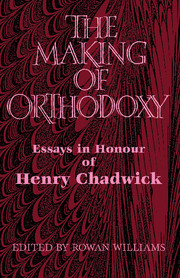Book contents
- Frontmatter
- Contents
- Preface
- List of abbreviations
- Bibliography of Henry Chadwick
- Does it make sense to speak of pre-Nicene orthodoxy?
- ‘And I have other sheep’ – John 10:16
- Reason and the rule of faith in the second century ad
- Adam in Origen
- Panegyric, history and hagiography in Eusebius' Life of Constantine
- Matthew 28:19, Eusebius, and the lex orandi
- The achievement of orthodoxy in the fourth century ad
- Eunomius: hair-splitting dialectician or defender of the accessibility of salvation?
- Some sources used in the De Trinitate ascribed to Didymus the Blind
- The rhetorical schools and their influence on patristic exegesis
- Pelagianism in the East
- The legacy of Pelagius: orthodoxy, heresy and conciliation
- Augustine and millenarianism
- Divine simplicity as a problem for orthodoxy
- The origins of monasticism
- Artistic idiom and doctrinal development
- Index of modern names
- Index of ancient and medieval names
- Index of sources
- Frontmatter
- Contents
- Preface
- List of abbreviations
- Bibliography of Henry Chadwick
- Does it make sense to speak of pre-Nicene orthodoxy?
- ‘And I have other sheep’ – John 10:16
- Reason and the rule of faith in the second century ad
- Adam in Origen
- Panegyric, history and hagiography in Eusebius' Life of Constantine
- Matthew 28:19, Eusebius, and the lex orandi
- The achievement of orthodoxy in the fourth century ad
- Eunomius: hair-splitting dialectician or defender of the accessibility of salvation?
- Some sources used in the De Trinitate ascribed to Didymus the Blind
- The rhetorical schools and their influence on patristic exegesis
- Pelagianism in the East
- The legacy of Pelagius: orthodoxy, heresy and conciliation
- Augustine and millenarianism
- Divine simplicity as a problem for orthodoxy
- The origins of monasticism
- Artistic idiom and doctrinal development
- Index of modern names
- Index of ancient and medieval names
- Index of sources
Summary
The range of Henry Chadwick's achievement is, of course, almost legendary – so much so that it was thought desirable to produce two volumes in his honour, one celebrating his continuing contribution to the work for unity between the Christian churches, the other concerned with his work as a patristic scholar over some four decades. The former volume, edited by Dr G. R. Evans and published by Oxford University Press, has already appeared. The present collection represents the tribute of fellow specialists to one who is perhaps uniquely a ‘master in Israel’ in the study of early Christian thought.
From the first, Henry Chadwick's researches have been concentrated on the question of how early Christianity developed an idiom of its own, especially in its long and fruitful (and often bad-tempered) conversation with the world of classical culture. Chadwick's first major production – in itself an achievement sufficient to guarantee his significance as a scholar – was a fully annotated translation of Origen's Contra Celsum, a work in which early Christianity's self-definition over against the religio-philosophical consensus of enlightened second-century minds has been decisively advanced, and the intellectual credibility of ‘Catholic’ Christianity defended at a new level of sophistication.
- Type
- Chapter
- Information
- The Making of OrthodoxyEssays in Honour of Henry Chadwick, pp. vii - xiPublisher: Cambridge University PressPrint publication year: 1989

